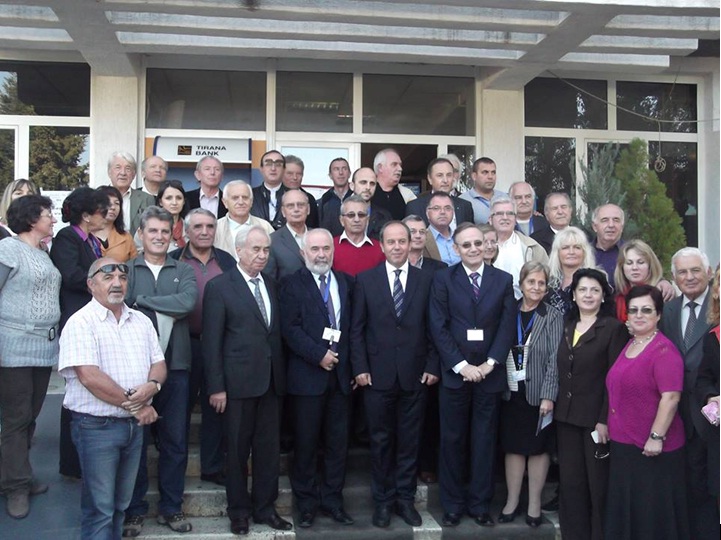For three days Academy of Sciences of Albania and Macedonia organized the Regional International Conference “The system “Prespa lakes – Ohrid lake”: The actual state – problems and perspective”, (under the auspices of the Prime minister of Albania and the Prime minister of Macedonia) in Struga – Pogradec on 27 – 29 October 2013.
Participants in this event were Presidents of the both Academy of Sciences, Academicians, Vice/Ministry of Environment and, Vice/Minister, Ministry of Education and Sports of Albania, Mr. Artan Shkëmbi, Mayor of Pogradec City, profesors from Polytechnic University of Tirana, Agricultural University of Tirana, St. Cyril and Methodius University, Skopje, Faculty of Natural Sciences and Mathematics, Skopje, Faculty of Natural Sciences, Tirana University, Institute of Geosciences, Energy, Waters and Environment, Polytechnic University of Tirana, Hydrobiological Institute, Ohrid, UNDP, Skopje, Faculty of Technology and Metallurgy, Skopje, Faculty of Natural Sciences and Mathematics, Skopje, ESPP , Greece, KFW Bank etc.

Objectives of the conference were an analysis and synthesis of the problems presented in different projects implemented by joint groups of researchers in the region; Drafting at the end of the conference a joint declaration for the scientific community and policy-makers; Orienting further studies according to priorities presented by this conference and in full collaboration between countries in the region.
At the end of the conference was signed a joint declaration on priorities and cooperation for protection of the region. (Makedonium)
Below we pass the Declaration
MACEDONIAN ACADEMY OF SCIENCES AND ARTS
ACADEMY OF SCIENCES OF ALBANIA
DECLARATION
RECOGNIZING the local, regional and international significance of this invaluable region comprising the Prespa and Ohrid lakes and their watersheds, the region’sdistinctive ecological values, specific hydrological, geomorphological and geological features, as well as social and cultural uniqueness;
AWARE that the combined influence of growing development pressures from human activities in the watersheds of the lakes and climate conditions have altered the functions and values of the lakes and their associated ecosystems, including changes in the water quality and quantity, the status of habitats and the species composition;
CONVINCED that these changes affect not only the region’s ecological values but also key economic sectors such as agriculture, tourism, water and fisheries management, all of which are essential for maintaining the socio-economic integrity and well-being of the local population;
AWARE that the unilateral approach taken by the countries sharing the watersheds of Prespa and Ohrid lakes in managing water and other natural resources constitutesone ofthe main obstaclesto more effective protection of the region’s unique values and the reduction of the transboundary impacts of developments in each country;
ACKNOWLEDGING that the ongoing degradation processes in the lakes are directly related to growing discharges of nutrients and pollutants from the point and diffuse sources in the watersheds, as well as to the loss of valuable landscape elements supporting the ecological integrity of the system (e.g., wetlands, riparian corridors and buffers),which is related to ineffective planning for land and water use and unsound resource management practices;
TAKING INTO ACCOUNT thatcurrent research and monitoring of the lakes and their watersheds, although in line with the highest international standards and models, is insufficient to attain a profounderunderstanding of the natural phenomena of the ecosystems and the ways in which they respond to growing human-induced pressures;
BEARING IN MIND the importance and potential offered by the multitude of international legal instruments, including the existing bilateral and multilateral agreements on thePrespa and Ohrid lakes, the relevant EU directives and the mechanisms of UNESCO;
EXPRESSING our gratitude for the generous financial and technical assistance of our international partners and supporters, such as UNDP, GEF, the Ramsar Convention, institutions of the EU, SDC, WB, KfW, GIZ, SIDA, WWF and others, in implementing a number of positive initiatives, development and research projects at national and transboundary levels, and acknowledging the results so far;
RECOGNIZING that any additional delay in taking decisive action against human-induced pressures may exceed the resilience levels of the lake ecosystems, triggering even more dramatic alterations with far-reaching adverse consequences for the natural and human environment;
WE, THE PARTICIPANTS of the Regional Conference ‘The System “Prespa Lakes – Ohrid Lake”: The Current Status – Problems and Perspectives’, co-organized by the Macedonian Academy of Sciences and Arts and the Albanian Academy of Sciences, under the auspices of the Prime-ministers of Macedonia and Albania, Mr. Nikola Gruevski and Mr. Edi Rama, attended by around one hundred participants from both Academies, higher representatives from the central and local governments, scientific and research institutions, universities, NGOs, experts and practitioners;
EXPRESSING OUR HIGHEST COMMITMENT to the preservation of the natural and cultural values of the region and its sustainable development, call on decision-makers and policy-makers from all states sharing the watersheds of the lakes, as well as representatives of the international community, researchers, scientists and professionals, community-based and civil society organizations and other stakeholders, for enhanced dialogue, cooperation and coordinated action for the following purposes:
- To align the visions of the transboundarystatesforpromoting the environmental protection and sustainable development of the region of thelakes in accordance with international legal instruments, EU directives, existing bilateral Agreement between the Council of the Ministries of Albania and Government of Macedonia for protection and sustainable development of Ohrid Lake and its watershed ratified by both Parliaments in 2005 and multilateral agreements regarding thePrespa and Ohrid lakes, and the principles of integrated transboundary watershed management;
- To spare no efforts and resources to introduce regular and harmonized transboundary monitoring of the biotic and abiotic environment, aligned with the WFD and other relevant EU directives and backed by appropriate national regulations and institutional set-up,so as to better understand the natural processes and functions of the lakes, including their carrying capacity, to track changes in the ecosystems over time, to support decisions for future interventions and to enable adaptive management of shared resources;
- To ensure that all future investments, public and private, including the development of social infrastructure, tourism, use of resources, agricultural development and others, are in line with the highest environmental standards, the needsof biodiversity conservation, the physical and biological limitations of the lakes’ ecosystems and their overall carrying capacity, aware of the magnitude of tangible and intangible environmental and social costs and benefits resulting from such investments;
- To ensure equitable allocations of water for the needs of the key social and economic uses (irrgation, water supply, recreation) and to support the integrity of the water-related ecosystems, including the maintenance of hydrological regimes and environmental flows in the river systems;
- To adoptcomprehensive scientific approaches for studying forests, subalpine pastures, agricultural lands, soils, pollution and social life;
- To identify environemntal management options that take into consideration the cultural integrity of the local communities;
- To identify options for improving the operation of thetransboundary system of protected areas so as to ensure better conservation of the important biological diversity and to improve the status of the landscape elements necessary for maintaining the integrity of both of the lakes’ ecosystems;
- To prevent the introduction of non-native species in the lake systems and their contributing waters;
- To establish mechanisms amongst states for a continuous exchange of qualitative and quantitative data on water, ecosystems, species and habitats and social aspects;
- To increase investments in education and the development of human capital for the needs of future cooperation and sustainable development of the transboundary region of the lakes (e.g., water resources management, aquatic ecosystems, monitoring and management of natural resources);
- To encourage the development of ‘green’ businesses to reduce unemployment and directly support the sustainability agenda for the region, including studying the options for the developing tourism that is sensitive towards nature;
- To build trust and promote exchange amongst central and local government institutions, scientific and research organizations, and citizens sharing the resources;
- To better coordinate financial and technical assistance from the international community so as to avoid duplication and overlapping of work and to maximize the positive effects of the supported programmes and projects;
- To take additional efforts to activate and/or keep operational the information exchange mechanisms in all cases of likely transboundary impacts resulting from activities in each of the states, in accordance to the Espoo Convention, as well as other Multilateral Environmental Agreements;
- To agree on future joint projects and complementary actions so as to contribute to balancing theregion’s conservation and development needs;
- To take the necessary steps and successfuly complete the initiative for declaring the Prespa and Ohrid Biosphere Reserve under the Man and Nature Programme of UNESCO;
- To continue supporting positive initiatives, such as this Conference,inwhich all states sharing the watersheds of the Prespa and Ohrid lakes will actively participate and contribute;
Struga, Pogradec, 27-29 October 2013

